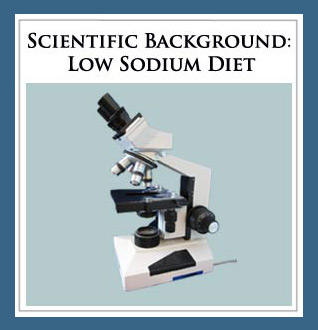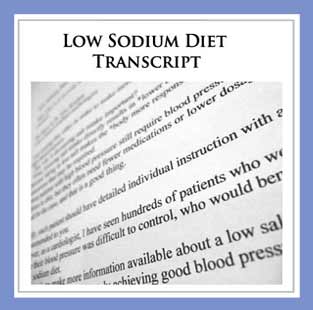 Scientific Background:
Scientific Background:
Salt intake has been shown to correlate with elevated blood pressure. The presence of high blood pressure becomes more common with age. In the United States, for example, it has been estimated that 80% of the population will have high blood pressure (≥140/90) or be on medication for high blood pressure by the age of 80.1 In a study of blood pressure levels and salt intake in 52 centers in 32 countries, the average blood pressure increased with age.2 The greater the salt intake (sodium chloride), the greater the tendency for blood pressure to elevate with age.
Interestingly, in the three populations studied with the very lowest salt intake, there was not an increase in blood pressure with aging. Though this study is a descriptive study and does not prove cause and effect, it supports the relation of salt intake to blood pressure.
Lower salt intake is helpful in patients with high blood pressure in reducing blood pressure elevation. A randomized trial published in the New England Journal of Medicine in 2001 evaluated the effects of salt restriction on blood pressure.3 A 1500 mg sodium restricted diet, when used without other dietary interventions, reduced systolic blood pressure (the “top number” of a blood pressure reading) by 6.7 mm Hg and the diastolic BP (“bottom number”) by 3.5 mm Hg.
When a low sodium diet was combined with a DASH (Dietary Approaches to Stop Hypertension) diet for hypertension, the result was a further decrease in blood pressure. For the participants in the trial with high blood pressure (≥ 140/90) at the onset, there was a reduction in systolic blood pressure of 11.5 mm Hg with a 1500 mg sodium restriction combined with a DASH diet. In participants without hypertension, there was a lesser reduction of 7.1 mm Hg.
Though the low sodium diet video on this website has been specifically created for patients with high blood pressure, the principles and concepts outlined are potentially helpful for any person trying to limit sodium intake.
Dietary sodium restriction can be beneficial as part of the treatment of volume overload in a number of medical conditions including congestive heart failure, liver failure, and kidney failure.4 In addition, the 2010 dietary guidelines from the Department of Health and Human Services5 recommends a 1500 mg sodium restriction for all individuals 51 years of age or older, all African Americans, and patients with diabetes or chronic kidney disease because of the increased frequency of high blood pressure and its resulting complications in these groups.
References:
1. Fields LE, Burt VL, Cutler JA, et al. The burden of adult hypertension in the United States 1999 to 2000: a rising tide. Hypertension 2004;44:398-404.
2. Intersalt Cooperative Research Group. Intersalt: an international study of electrolyte excretion and blood pressure. Results for 24 hour urinary sodium and potassium excretion. BMJ 1988;297:319-28.
3. Sacks F, Svetkey L, Vollymer W et al. Effects on blood pressure of reduced dietary sodium and the Dietary Approaches to Stop Hypertension (DASH) diet. N Engl J Med 2001;344:3-10
4. The Washington Manual of Medical Therapeutics, 33rd Edition. 2010. Lippincott Williams & Wilkins
5. Dietary Guidelines for Americans, 2010. http://www.health.gov/dietaryguidelines

